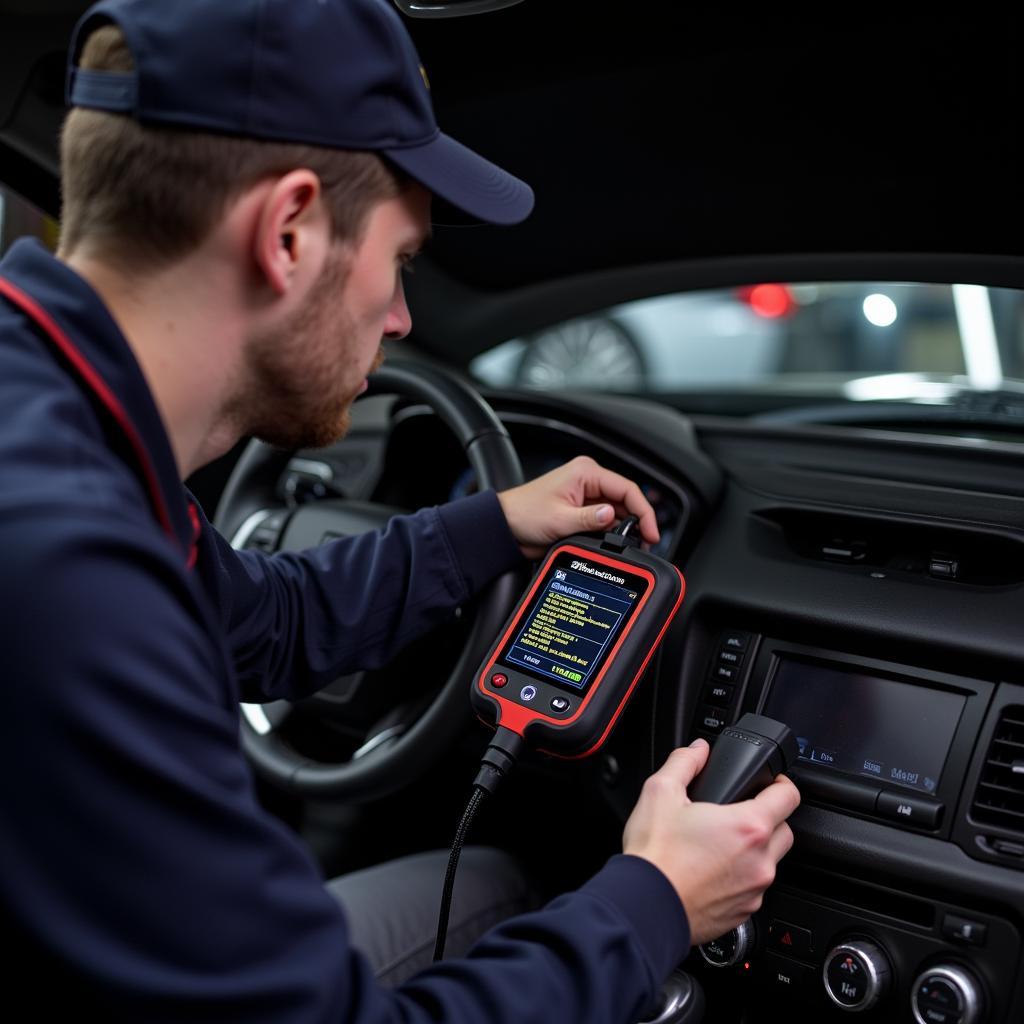Automatic Car Acceleration Problems can be frustrating and even dangerous. This guide will delve into the common causes, diagnostic procedures, and solutions for these issues, empowering you to address them effectively. We’ll explore everything from simple maintenance tasks to more complex mechanical and electronic failures.
 Diagnosing Automatic Car Acceleration Problems
Diagnosing Automatic Car Acceleration Problems
Understanding Automatic Car Acceleration
Automatic transmissions offer convenience but can present unique challenges when acceleration problems arise. Unlike manual transmissions, where the driver controls gear changes, automatics rely on a complex system of hydraulics, electronics, and sensors. A glitch in any of these components can lead to issues ranging from sluggish acceleration to unintended surges.
What are the most common symptoms? They include slow acceleration, hesitation, jerky movements, or even sudden unintended acceleration. Identifying the specific symptoms is the first step towards pinpointing the root cause of the problem.
Common Causes of Automatic Car Acceleration Problems
Several factors can contribute to acceleration problems in automatic cars. These include:
- Throttle Position Sensor Issues: A faulty TPS can send incorrect signals to the engine control unit (ECU), resulting in improper fuel delivery and acceleration problems.
- Transmission Fluid Problems: Low or dirty transmission fluid can hinder smooth gear shifting and acceleration. Regular fluid changes and checks are crucial.
- Clogged Fuel Filter: A restricted fuel filter can starve the engine of fuel, causing sluggish acceleration and poor performance.
- Mass Airflow Sensor (MAF) Malfunction: The MAF sensor measures the amount of air entering the engine. A faulty MAF sensor can disrupt the air-fuel mixture, affecting acceleration.
- Vacuum Leaks: Leaks in the intake manifold or vacuum hoses can disrupt the engine’s air intake, leading to poor acceleration and other performance issues.
Identifying and Troubleshooting Acceleration Issues
Diagnosing automatic car acceleration problems often requires specialized tools and knowledge. However, some preliminary checks can be performed by car owners:
- Check the transmission fluid level and condition. Look for low fluid or a burnt smell.
- Inspect the air filter and fuel filter. Replace if dirty or clogged.
- Listen for unusual noises from the engine or transmission. Any whining, grinding, or knocking sounds could indicate a problem.
car problems after being rear ended
When to Seek Professional Help
While some basic checks can be done at home, more complex issues require the expertise of a qualified mechanic. If you experience persistent acceleration problems, it’s best to seek professional help. “Ignoring acceleration problems can lead to more serious and costly repairs down the road,” says automotive expert John Miller, ASE Certified Master Technician.
car problems after rear end collision
Preventing Automatic Car Acceleration Problems
Regular maintenance is key to preventing acceleration problems and ensuring the longevity of your automatic transmission. This includes:
- Regular Transmission Fluid Changes: Follow the manufacturer’s recommended intervals for transmission fluid changes.
- Routine Inspections: Regular check-ups can help identify potential issues before they become major problems.
- Promptly Addressing Minor Issues: Don’t ignore warning signs like rough shifting or unusual noises.
 Following Car Maintenance Schedule
Following Car Maintenance Schedule
“Preventative maintenance is the best way to avoid costly repairs and keep your automatic transmission running smoothly,” advises Susan Davis, automotive engineer and consultant.
Conclusion
Automatic car acceleration problems can stem from various causes, ranging from simple maintenance issues to complex electronic malfunctions. By understanding the common causes and taking proactive steps, you can effectively address and even prevent these problems. Regular maintenance, prompt attention to warning signs, and seeking professional help when needed are essential for a smooth and safe driving experience. Remember, addressing automatic car acceleration problems early can save you time, money, and potential headaches down the road. Connect with us at AutoTipPro for personalized assistance. Our contact information: Phone: +1 (641) 206-8880, Office: 500 N St Mary’s St, San Antonio, TX 78205, United States.
FAQ
- What are the first signs of automatic transmission problems? Common signs include slipping gears, rough shifting, delayed engagement, and unusual noises.
- How often should I change my automatic transmission fluid? Refer to your owner’s manual for specific recommendations, but typically every 30,000 to 60,000 miles.
- Can I check my transmission fluid myself? Yes, using the transmission dipstick. Ensure the engine is warm and running.
- What causes sudden unintended acceleration in automatic cars? Potential causes include faulty sensors, throttle cable issues, or electronic glitches.
- How much does it cost to fix automatic car acceleration problems? The cost varies depending on the underlying issue and can range from a few hundred to several thousand dollars.
- Is it safe to drive with automatic car acceleration problems? It depends on the severity. If you experience sudden unintended acceleration, it’s crucial to stop driving immediately and seek professional help.
- Can regular maintenance prevent automatic car acceleration problems? Yes, regular maintenance, including fluid changes and inspections, can significantly reduce the risk of acceleration issues.




Leave a Reply